When I survey the media landscape and mentally sift through the plethora of artists and articles, pictures and portrayals, movies and music videos that continually feed the perspective and perception of Black people, it begs the question...who is ultimately responsible?
Of course, the clear and obvious answer is Black people ourselves. The complication, however, is in how that should be done.
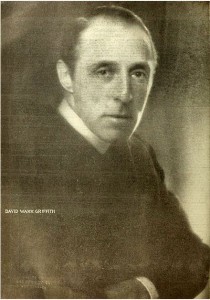 For some time now, Black people have been relegated to policing duties. Policing after-the-fact is more accurate. February 8th, 2015 marked the 100 year anniversary of the release of D.W. Griffith's controversial film Birth of a Nation. This film is arguably the most successful commercially and damaging to blacks perceptually of all time. The film, set during the civil war and post civil war reconstruction era, portrayed Black men as mindless, lazy brutes, who sought to lay around doing nothing all day - except when a white women came around. At that point, upon sight of her, they were overcome by their sexual desires for her, and would seek to have her...by force if necessary. If that's not bad enough, the heroes of the story, the ones that came to the rescue of white women and to save the country in the larger view, was....wait for it.... The Ku Klux Klan. In fact, the original title of Birth of a Nation was The Clansman, based on Thomas Dixon Jr.'s 1905 novel of the same name.
For some time now, Black people have been relegated to policing duties. Policing after-the-fact is more accurate. February 8th, 2015 marked the 100 year anniversary of the release of D.W. Griffith's controversial film Birth of a Nation. This film is arguably the most successful commercially and damaging to blacks perceptually of all time. The film, set during the civil war and post civil war reconstruction era, portrayed Black men as mindless, lazy brutes, who sought to lay around doing nothing all day - except when a white women came around. At that point, upon sight of her, they were overcome by their sexual desires for her, and would seek to have her...by force if necessary. If that's not bad enough, the heroes of the story, the ones that came to the rescue of white women and to save the country in the larger view, was....wait for it.... The Ku Klux Klan. In fact, the original title of Birth of a Nation was The Clansman, based on Thomas Dixon Jr.'s 1905 novel of the same name.
The NAACP, National Association for the Advancement of Colored People, sought to prevent the distribution of the film, by preventing the showing of it in several cities. They had some success, but clearly it was not nearly enough, as the film went on to become the most successful film of its time.
For decades following Birth of a Nation, Black people were forced to endure the early indignity of seeing themselves portrayed in stereotypical fashion; mammies, bug-eyed shuffling, yassuh-boss-spouting negroes. Interestingly, white men, often enough, also portrayed themselves as Blacks though the medium known as Blackface.
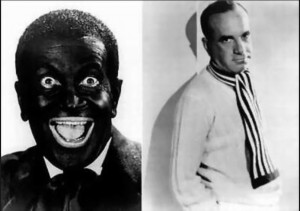 In fact Al Jolson, made his career, singing in Blackface over the span of almost twenty years, making hit albums, selling out shows, and movie roles and appearances. This was not a new phenomenon introduced by Al Jolson, Blackface had been part of American theater culture for some time. Jolson, however, did take it to the international level.
In fact Al Jolson, made his career, singing in Blackface over the span of almost twenty years, making hit albums, selling out shows, and movie roles and appearances. This was not a new phenomenon introduced by Al Jolson, Blackface had been part of American theater culture for some time. Jolson, however, did take it to the international level.
Later, by the 60's as Hollywood shifted to more white bread fair; The Graduate, Mary Poppins, The Sound of Music, Laurence of Arabia, Breakfast at Tiffany's, Blacks once again drifted to the back, and became more of an afterthought or a screen dressing. You know, the token that gets tossed in so that Black moviegoers have half a reason to go see it. Of course, said Blacks also became the first to be killed if the storyline determines that someone had to die(kind of like the red-shirted ensign on Star Trek). Not hard to understand though, really, as the writers, producers, directors, and pretty much everyone else of influence in delivering the film, were all white.
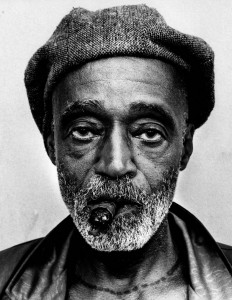 That all changed in 1971 when Melvin Van Peebles burst onto the scene with his film Sweet Sweetback's Baadasssss Song, a film produced with his own money(and a loan from Bill Cosby), and directed, edited, marketed, and distributed by himself. The film was a success, in large part because of Blacks desire to see ourselves as the star/hero of a film, not just another expendable, insignificant, throwaway character. This desire to see ourselves in power positions, led to more and more films, and sparked was later termed as the Blaxploitation era. One thing that must be noted and remembered, is that THAT era was what saved Hollywood from going under, as the box office of those urban themed Black films(powered by dollars from Black moviegoers) is what kept many production companies from going bankrupt. In the history of American film, like it or not, that era will go down as the the Golden age of Black cinema. That being said, as the "Blaxploitation" box office started to decline, so did Hollywood's interest in producing Black films. And no interest, meant no money...a position that has carried forward, in varying degrees, to the present state of affairs.
That all changed in 1971 when Melvin Van Peebles burst onto the scene with his film Sweet Sweetback's Baadasssss Song, a film produced with his own money(and a loan from Bill Cosby), and directed, edited, marketed, and distributed by himself. The film was a success, in large part because of Blacks desire to see ourselves as the star/hero of a film, not just another expendable, insignificant, throwaway character. This desire to see ourselves in power positions, led to more and more films, and sparked was later termed as the Blaxploitation era. One thing that must be noted and remembered, is that THAT era was what saved Hollywood from going under, as the box office of those urban themed Black films(powered by dollars from Black moviegoers) is what kept many production companies from going bankrupt. In the history of American film, like it or not, that era will go down as the the Golden age of Black cinema. That being said, as the "Blaxploitation" box office started to decline, so did Hollywood's interest in producing Black films. And no interest, meant no money...a position that has carried forward, in varying degrees, to the present state of affairs.
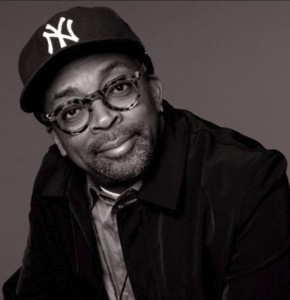 Sure, we have independent filmmakers like Spike Lee, who have worked a step or two outside of the Hollywood circle, in terms of subject matter. But we have many more of the ilk of the Antoine Fuqua's, John Singleton's, Lee Daniels, and Tyler Perry's.
Sure, we have independent filmmakers like Spike Lee, who have worked a step or two outside of the Hollywood circle, in terms of subject matter. But we have many more of the ilk of the Antoine Fuqua's, John Singleton's, Lee Daniels, and Tyler Perry's.
What does this mean, in terms of how we address stereotypes? How do we proportionally assign responsibility, to a black director on a film produced by the now corporate Hollywood, that regurgitates and recirculates mammies, buffoons, and or coons? Particularly when we know, as a result of the Sony hack scandal several months back, that the Hollywood opinion of some of the biggest Black names in entertainment is still - in this day and age - shockingly, prejudicially, low.
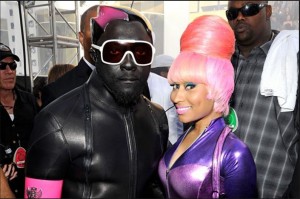 What about the music industry? Who do we take to task(Police) for the relentless barrage of videos, featuring artists singing and rapping lyrics which glorify materialism, gangster and criminal culture, and promote the objectification of women? What about the women who objectify themselves? Or are we to continue a hands off approach, while the lies are continually being sold? Given that hip hop and R&B music are global commodities, the damage being done globally to the image of Blacks is compounding faster than the interest on America's debt.
What about the music industry? Who do we take to task(Police) for the relentless barrage of videos, featuring artists singing and rapping lyrics which glorify materialism, gangster and criminal culture, and promote the objectification of women? What about the women who objectify themselves? Or are we to continue a hands off approach, while the lies are continually being sold? Given that hip hop and R&B music are global commodities, the damage being done globally to the image of Blacks is compounding faster than the interest on America's debt.
Anyone paying attention to the constant parade of headlines of late, will note the peculiar trend of Black men being killed at the hands of police, because of their "perceived danger" and apparent ability to instill an acute fear of life loss in trigger happy, taser gun possessing, mace spraying police officers. Of course, the fear and hunting of black men has been in effect long before there was a music industry, ever since Black people were first led off the the ships, in fact. Nevertheless, all this brainwashing is certainly not helping our collective situation by any means.
WE ARE the guardians of our own image. We have to be careful and consider how our projects, images, and offerings effect the perception of us, like a corporation would in looking after its brand.
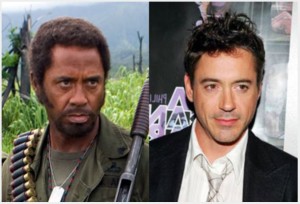 That means going beyond policing after-the-fact, and into producing and supporting more projects by us for us. We must be the change that we want to see. It is critical that we support constructive, worthwhile projects that offer something to the collective culture and its advancement, and that we pan the same ol' same ol' that does nothing more than hold us back.
That means going beyond policing after-the-fact, and into producing and supporting more projects by us for us. We must be the change that we want to see. It is critical that we support constructive, worthwhile projects that offer something to the collective culture and its advancement, and that we pan the same ol' same ol' that does nothing more than hold us back.

